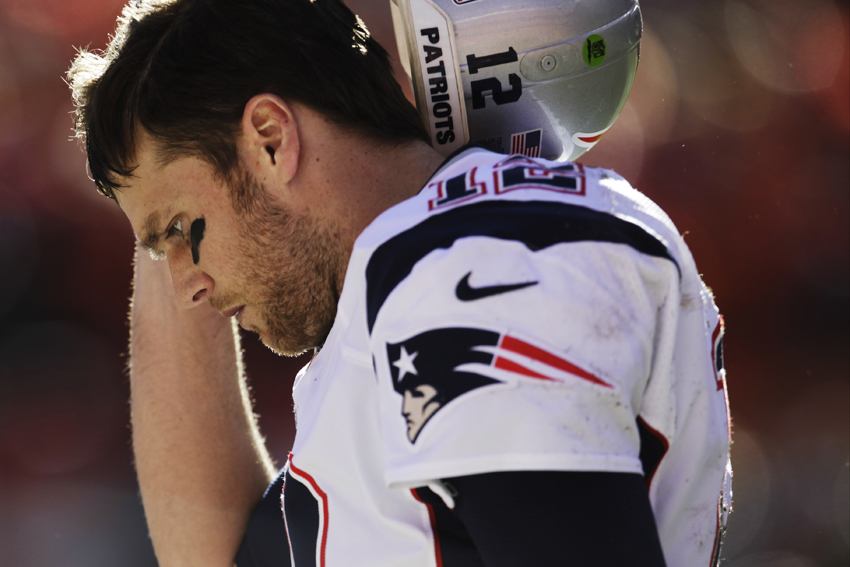Will Brady-Belichick Make It To Another Super Bowl?

Photo via AP
In a matchup billed as “Brady vs. Manning XV,” with a berth to Super Bowl XLVIII on the line, Tom Brady and the New England Patriots failed to overcome a championship-worthy performance from Peyton Manning and the Denver Broncos in Sunday’s 26-16 loss in the AFC Championship game.
While Bill Belichick and Brady still boast a 10-5 overall record against Manning, the winningest coach-quarterback tandem in NFL history is just 1-2 against Manning-led teams in AFC Championship games. Whether their relative lack of success in the biggest games against Manning and their decade-long Super Bowl drought remain blemishes on the Brady-Belichick résumé is an open question, but one that would be resolved if the two led the Patriots to an improbable return to the NFL’s biggest stage.
Why improbable? Because if Brady and Belichick’s Patriots win next year’s title—or any subsequent year after that—the two would have the highest combined age of any coach-quarterback duo to win the Super Bowl in NFL history. In 2014-15, Belichick (62) and Brady (37) will have 99 years between them, which would eclipse the previous high of 96 set by Tom Coughlin (65) and Eli Manning (31) back in 2012. Coughlin and Manning comfortably out-seasoned the previous high of 91 years, established by the 1999-2000 Rams’ Dick Vermeil and Kurt Warner. (Then again, if the Broncos win the Super Bowl in just under two weeks time, head coach John Fox and Peyton Manning will have a combined age of 95 years and would fall just six days short of tying Coughlin and the younger Manning’s record as Fox’s birthday is February 8.)
Given Coughlin’s recent success—for which Patriots fans need no refresher—and the fact that three of the final four teams in the playoffs were stewarded by three of the six oldest coaches in the NFL, there’s preliminary evidence to suggest that this might be a golden age for, shall we say, the league’s more mature head coaches.
Unfortunately, while the anecdotal evidence is promising, it becomes clear that aging head coaches typically experience a steady decline in success after reaching a certain age when the sample is expanded. According to research compiled by FantastyDouche.com (a rather unsophisticated name for a strong source of football analysis) on aggregate coaches peak when they are 47 years old as measured by single-season win percentage compared to their career average. After that point, coaches tend to see a steady regression toward their career average, followed by a brief plateau in their mid-fifties, before experiencing a drastic drop in their late fifties that continues into their early sixties. Furthermore, the research finds a negative correlation between age and relative success as determined by four metrics: average age of Super Bowl winners (48.9 years old); conference champions (49.7); winning records (50.4); and losing records (50.9).
Of course, there are exceptions to the aggregate, and Belichick appears to be chief among them. In his 19 seasons as a head coach between New England and Cleveland, Belichick has a career .655 winning percentage. Considering Belichick’s current age, the data would have predicted the him to demonstrate a sharp decline over the previous four years of his coaching career, which numerically would represent a sheer drop off from a career-average winning percentage in years 52 through 57 to a 2-10 percent in winning percentage between years 58 and 61. Instead, Belichick has bucked the trend altogether and seen an improvement on his career winning percentage each of the past four seasons. In fact, even if one isolates Belichick’s years in New England, where he owns a .725 winning percentage over 14 seasons, the Patriots’ coach and de facto general manager has outpaced his tenure in New England over the period that’s typically most taxing on older head coaches.
And if Belichick is an extreme outlier among head coaches, why shouldn’t the same be true for Brady? While the NFL is a young person’s league, the quarterback position is a notable exception. According to data compiled by SportsData, the average Super Bowl-winning quarterback is 29.8 years old, and 47 percent of winning signal callers have been 30 years or older when they won. There are also a number outliers on the far right tail, which may provide further hope for Brady. Including Manning this season, five different NFL quarterbacks (who account for six data points as John Elway accomplished it twice) aged 37 or older have started under center in the Super Bowl. Combined, they’ve accounted for three titles—one from Johnny Unitas and two more from John Elway, the oldest quarterback in NFL history to hoist the Lombardi Trophy at age 38.
Could Brady add his name to that list and cement his legacy as one of the best big-game quarterbacks of all time? Can Belichick continue to defy the numbers that suggest a dramatic decline in wins is looming? There are notable exceptions both for aging quarterbacks and coaches who have made dramatic Super Bowl runs late in their careers. Certainly the odds are long for Belichick and Brady, but given all that has come before, it would be foolish to count them out altogether.

